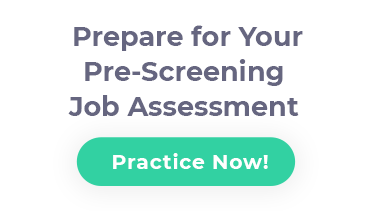Assessment Center Role Play Preparation [2025]

Along with case studies and in-tray exercises, role plays are extremely popular exams in assessment centers. They are done to give the assessor a clear idea of how the job seeker or graduate handles situations on the job that are stressful. It is one of the best ways to test a candidate for suitability to the job during the screening and hiring process because it shows the individual in action and is applicable to almost every job position or employer. Assessors can clearly see how the individual will respond when put on the spot or when dealing with conflict. And since the ability to perform well on the task directly correlates to the applicant’s familiarity with the role’s key competencies and behaviors, employers get a good idea of how well the applicant knows the job area they are applying to work in.
What Are Role Play Exercises?
Role play exercises are assessment activities where candidates act out imaginary situations that are similar to those that might occur in the position they have applied for. Often, assessors bring in professional actors to interact with the individual being assessed, though if the situation involves specific knowledge of the company or industry, an interviewer from the company may play the role instead.
The exercise allows the applicant to display competency in a few key areas:
- Planning and adaptability
- Dealing with conflict
- Reactive skills (ie: responding to the unknown)
- Decision-making abilities
- Interpersonal and communication skills
Any candidate taking part in a role play needs to display these areas of competency, and the role play provides the perfect arena to do so if the applicant has prepared properly. These are the general requirements listed above, but other positions may also require additional aptitudes.
Media positions, in particular, often require other competencies because the individual will be dealing with the media and will act as the face of the company. The last three in the general list, it should be noted, depend on the role played in the role play. Not all positions will require these of the individual.
What to Expect?
The role play exercise could cover a wide variety of scenarios. Usually, however, they deal with some common job issues such as the following:
- Handling a difficult customer or complaint
- Disciplining or appraising staff member
- Negotiations on contract or project delivery
- Meeting to discuss company equality records
- Discussing various aspects of company mergers
- Poor financial results
- Office or plant closures
- Environmental issues
When taking a role play assessment, applicants will be observed either directly or through recording. This means there are three ways the role play could take place: in person, on the phone, or via a recorded session. Recordings are becoming increasingly popular with assessment centers.
Many places also utilize the phone option, and they record interactions that way to save money and time. Applicants usually will not know for sure how they will be assessed until they are about to take part in an exercise. Whatever way the assessment happens, all candidates face similar challenges and experiences in their role plays.
The role play exercise provides anywhere from ten to thirty minutes to read briefing information depending on the subject matter of the role play. Then, between twenty and thirty minutes are provided for the actual exchange.
Since this is not a long period of time, role play exercises require applicants to be capable of controlling the dialogue to reach the necessary conclusion or outcome they are seeking. The ability and speed with which they are able to reach the main issue will directly reflect upon their planning and analytical skills in the minds of the assessors.
How to Prepare for Role Plays?
Preparing for a role play may seem confusing or difficult. It may also feel a bit awkward. Candidates in the past sometimes complain that it feels like acting. Unfortunately, there is no way around that, but a bit of preparation can help you to get into your role and perform well.
Once in the role play preparation stages, prepare properly by carefully reading all the information in your brief. Missing important pieces of information will not only reflect badly but will also result in mistakes and a lack of confidence in the role play. If it would help and you have time, you can write a structured plan during the time for reading the brief to cover the most important points and the actions needed to complete the role play.
Role Play Exercises Tips
The tips below should help you start as you look at practicing with role play examples online or with friends and family. They will also help you if you utilize them during the actual role play exercise.
- Be confident. Nervous and weak appearances or failure to deal with situations confidently and professionally will gain you negative feedback.
- Know what you are supposed to do in the scenario.
- Display positive body language if it is a recording or live event.
- Maintain good eye contact with the person you are doing the exercise with whether you use a plan or not.
- Think like an employee of the company you’re applying for as you deal with the role play.
- Practice with family or friends or have a mentor coach you as you prepare for the exercise.
- Imagining that you will have to work with the role play character again may help you focus on winning them over instead of arguing with them.
Conclusion
Role plays are longer, more complex exercises. They really require applicants to get into the role they are representing in order to do well. If the assessment center has employed actors, their job is to draw you in and help you not to focus on the awkward feel of role playing so that you can focus on responding as needed to the actual scenario, and they are generally very good at this.
Although every effort has been made to ensure every candidate has a similar experience in the role play, you should do your best to practice beforehand. If you can, find a friend or family member who will let you practice establishing rapport, easing the tension, and then negotiating for a solution to the problem. If you are able to carry that practice over into the exercise, remain calm and confident, and deal with the tense situation professionally and positively, you should stand out in your role play.

